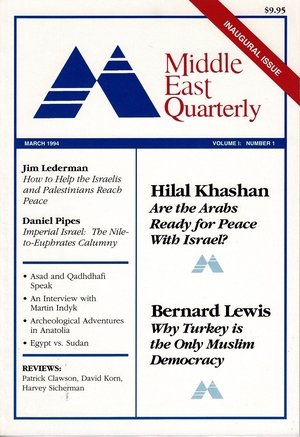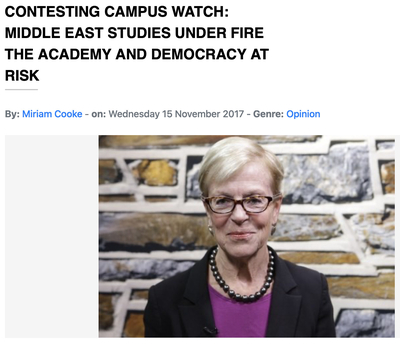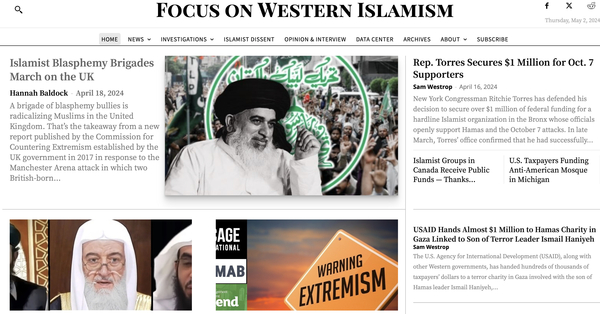The title of this conference, "The Middle East Forum at 30: Shaping the Next Three Decades," provides me with a perfect excuse to open the day's activities by indulging in some reflections and offering you several anticipations.
My introduction has five parts. I'll begin by offering a perspective on my reasons for founding the Middle East Forum 30 years ago; then review ten major changes over those decades; then outline our focus on strategy, not advocacy; note some of our successes; and conclude by looking ahead.
Founding
 When we opened doors in January 1994 during a particularly brutal winter – our first board meeting suffered from a brown-out due to frozen coal – the Middle East Forum consisted of just a single activity, namely a journal, the Middle East Quarterly. In its first issue, I asked, "why this journal at this time? Aren't there already many quarterlies that specialize in the Middle East?" My answer:
When we opened doors in January 1994 during a particularly brutal winter – our first board meeting suffered from a brown-out due to frozen coal – the Middle East Forum consisted of just a single activity, namely a journal, the Middle East Quarterly. In its first issue, I asked, "why this journal at this time? Aren't there already many quarterlies that specialize in the Middle East?" My answer:
"There are, indeed, but their outlook differs in fundamental ways from ours. First, none of them look at the region explicitly from the viewpoint of American interests. Secondly, they reject to varying degrees the views of most Americans and the enduring policies of the U.S. government over a dozen administrations. Many even tend to sympathize with states and organizations hostile to this country.
"In contrast, the Middle East Forum ... supports strong ties with Israel ... and other democracies as they emerge; urges strong measures to eradicate terrorism and control both conventional and unconventional arms proliferation; works for human rights throughout the region; seeks a stable supply and a low price of oil; and promotes the peaceful settlement of regional and international disputes."
We shortened this to the slogan of "Promoting American interests and Western values." Sadly, as events since Oct. 7 have shown, specialists on the Middle East and Islamism are even more antagonistic today to American interests and Western values than their elders were in 1994. For that reason, I submit, the Middle East Forum is more necessary than ever. At this rate, it will be yet more needed in the future.
Developments
Ten major developments then changed the organization over these 30 years. These included:
- The internet, which fundamentally transformed how we research, organize, and communicate. Our website, MEForum.org – which will be overhauled in two weeks – symbolizes this change. I think back to our early mass mailings – the copy machine, all those sheets of paper, envelopes, and stamps, culminating with a run to the post office. In this context, I'd like to mention Thelma Prosser, the only other MEF employee beside myself whose employment goes the whole way back to 1994 and who has been running the office that entire time.
- The failure of Middle East studies compelled us to create Campus Watch. Under the long-time supervision of Winfield Myers, it monitors, critiques, and battles our university counterparts. The professoriate's response to CW has been as extreme as its politics. miriam cooke (lower case) of Duke University captured its spirit writing in 2005 that the "warriors" of Campus Watch "are already changing the rules of the game not only in Middle East studies but also in the US University as a whole."

- The evolution of Islamism from a mostly violent movement to a mostly law-abiding one. This challenged us to argue that this more subtle menace holds greater dangers than violence and criminality. That is hardly intuitive. Sam Westrop has taken our Islamist Watch project into new directions with deeply researched and original, sometimes shocking reports.
- The mass migration of Middle Easterners to the West added a completely new topic to our portfolio. This eventually led to the founding of Focus on Western Islamism, a publication edited by Dexter Van Zile. We see it primarily as a source of news, making up for the scandalous inattention of major media.
- A massive frustration with the so-called peace process and the emergence of the Israel Victory Project, led by Alex Selsky and Ashley Perry. Oct. 7 has paradoxically made victory a widespread idea in Israel – Netanyahu has referred to it over 50 times since that date – but in others, it is further away than ever. Into this turmoil, my book, "Israel Victory: How Zionists Win Acceptance and Palestinians Get Liberated" will be published in a month.
- We now have an investigative operation, thanks to Gregg Roman, with both intelligence and legal aspects ranging from revealing corruption in Qatar's bid for the World Cup to bringing a lawsuit against the organizers behind the current spate of antisemitic events on American campuses.
- An awareness that the only way to push back on the Iranian menace is through an Iran Freedom Project that calls for regime overthrow. We have only begun this project, which Jonathan Spyer and Jim Hanson lead, so expect to hear more about it soon.
- The need to translate these projects into public policy, which led to the creation of what we now call MEF Action, led by Benjamin Baird. Later in this talk, I will offer some examples of its work.
- A growing need to publish oped-length analyses and the creation of the just-created Middle East Forum Observer, edited by Michael Rubin. It provides us with a platform for brief research and analysis to complement the Quarterly.
- The litigiousness of our opponents inspired us to create the Legal Project, a fund and a brain trust to protect our side's ability to maintain its right to public freedom of speech. I am happy to report that this problem is in abeyance, due in part to our successes, and so the Legal Project is currently on hold.

Strategy, Not Advocacy
Our goal is to provide strategic counsel, as opposed to advocacy or apologetics. To understand what this means, look at the Arab-Israeli conflict, which attracts particularly intense attention and vehement views. (The same applies, however to other topics, including Islamism, the Erdoğan regime, and the Islamic Republic of Iran.)
Advocates fill the news pages and airwaves with passionate statements of justification and condemnation. Their work involves morality: which of the combatants acts with justice, and which acts in evil ways? Advocates who win this argument shape public opinion and that, in turn, influences or even determines government policies.
But morality and justice are not the only important debate; another one, more specialized, concerns strategy – not who is right or wrong, but how to win. This latter focuses on an assessment of forces and offers ideas how to achieve one's goals. The strategist takes the goals for granted (i.e., a secure Israel) and focuses on achieving them.
Advocacy and strategy each have their role. The advocate speaks of right and wrong, the strategist deals with success and failure. Passion marks the former, ice runs in the latter's veins. One engages in media criticism, the other in criticism of his own side. The advocate would choke on presenting his adversary's viewpoint but the strategist routinely puts himself in his opponent's place (think of war games). For example, I have imagined myself in charge of the Islamist movement, figuring out what it should do so as to understand how best to stop it.
Advocates seek to convince the undecided; strategists seek to guide those who agree. The Middle East Forum focuses primarily on strategic activities. This makes, I believe, the best use of our expertise.
To defend our outlook, attack the views of our opponents, and convince the undecided are crucial tasks, but they are not ours. MEF focuses on helping our side figure out how to win.
Debates, responses, corrections, defenses, polemics, apologetics, and public diplomacy have a crucial role; but the Forum is engaged in finding the path to victory.
Successes
This approach has propelled a number of policy successes.
Perhaps the most important of these has been the under-standing of Islamism-the-ideology as a phenomenon distinct from Islam-the-religion. So complete has this break-through been that it strains the imagination to recall the understanding of just 25 years ago, when nearly all Americans perceived an undifferentiated Islam as the topic.
Jumping to the present, here are a few recent accomplishments.
- Working with Iranian activists, we won the suspension of Mohammad Jafar Mahallati, a former Iran regime official responsible for covering up crimes against humanity, from his Oberlin College position, where he was known, ironically, as the "professor of peace."
- A nationwide effort to persuade hotel chains to stop hosting Islamist groups with connections to U.S.-designated terrorists has had success. Thus, we canceled two major events in Ft. Lauderdale, one hosted by the South Florida Muslim Federation, the other by the Islamic Circle of North America. We had a hand in getting Rep. Summer Lee, a member of the House "squad," to cancel her appearance at CAIR's Philadelphia fundraiser.
- We played a lead role in the recent passage of Maryland House Bill 763, a law to remove CAIR from a "Commission on Hate Crimes Response and Prevention." We worked with the bill's sponsors, testified at hearings, and mobilized local activists to support the legislation.
- Fidelity Investments has $5 trillion in assets under management and $13 trillion in assets under administration. Working with the staff at its donor-assisted fund, or DAF, we succeeded in expelling two Islamist organizations tied to designated terrorist groups as beneficiaries: those are American Muslim for Palestine and Rahma Worldwide Relief and Development.
- Our "Divest from Qatar" campaign resulted in 25,000 emails delivered to a dozen CEOs of America's top private equity and hedge fund firms doing business with Qatar. The campaign was discussed in the Washington Post and hundreds of financial and local news outlets. We are still assessing the results.
Looking ahead
And the next 30 years? Some observations:
The Middle East is likely doomed to remain the world's most volatile region due to the enduring power of anti-modernist forces, religious passions, the abundance of hydrocarbons, and geographic centrality. In short, our work will not soon be done.
The region hosts discouraging problems that seem to fester without end, including dictatorships, Islamist movements, the Palestinian-Israeli conflict, and weapons proliferation.
But there are also some hopeful signs: Islamism peaked a decade ago and is in relative decline; Iranians are sick of the Islamic Republic; and the Arab states have largely left the conflict with Israel. Civilizationism is slowly gaining numbers and strength.
This last point has special personal interest. Having just last week finished my book on Israel Victory, and having enjoyed the experience, I now ponder writing another book. My working title? "The New Europe: Muslim Immigrants and Western Civilizationists."
In conclusion, a word of gratitude to our thousands of generous donors, far-sighted individuals who have made our work possible. Speaking on behalf of the entire staff, we are conscious each day of our good fortune to have your trust and support. We feel privileged to be doing the work at hand, work that is a passion for all of us.
Finally, I am delighted to see a new generation forwarding the work MEF began in 1994. The staff has a greater range of skills and connections than I ever did. It also has an energy I admire, as shown by this conference, our second of many to come.
 MEF staff meeting on May 13, 2024. From the left: Liron Yadin, Benjamin Baird, Winfield Myers, Jonathan Spyer, Gregg Roman, Jim Hanson, Michael Rubin, Dexter Van Zile, Sam Westrop. |
Located at great distances from each other, we only come together in person at these conferences. Overwhelmingly, we communicate via electronics. I particularly enjoy the palpable sense of excitement as we text each other about issues of the day.
The staff's capabilities, dedication, and hard work give me confidence that the organization will remain at the forefront of strategic thinking and policy influence concerning the Middle East and Islamism.
Mr. Pipes (DanielPipes.org, @DanielPipes) is president of the Middle East Forum. © 2024 by Daniel Pipes. All rights reserved.